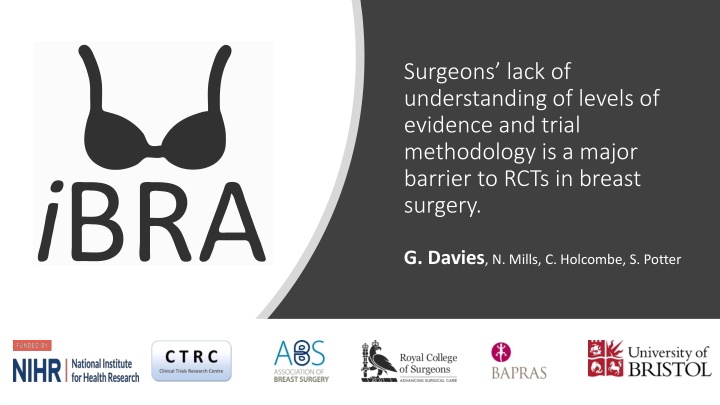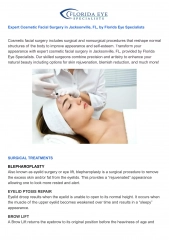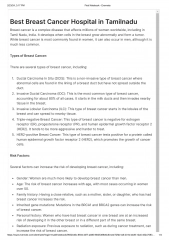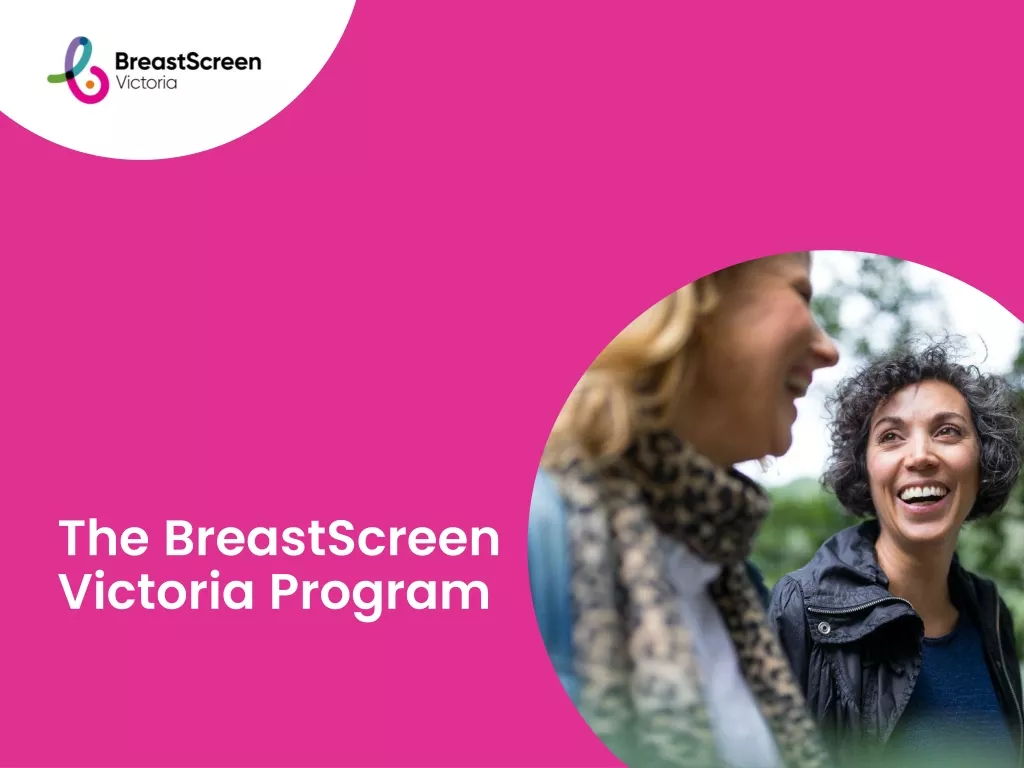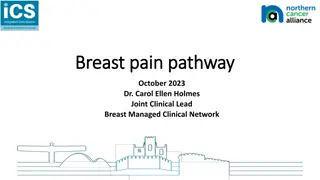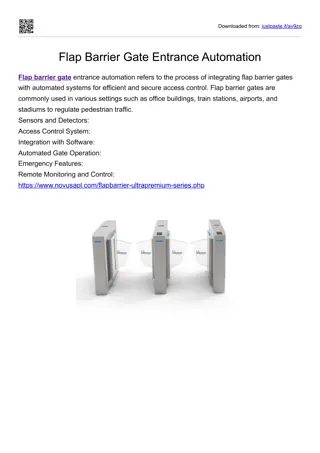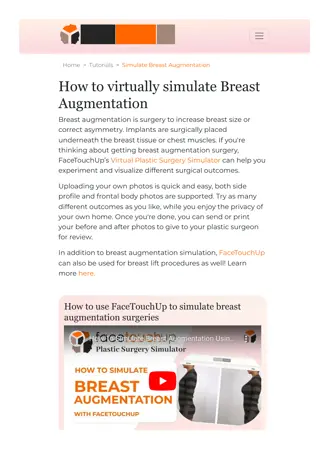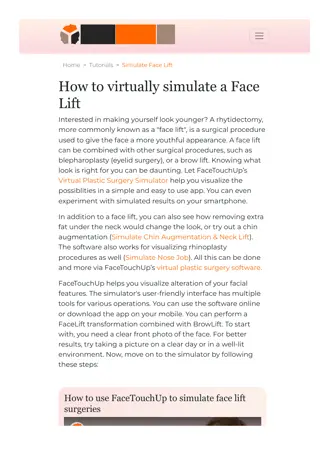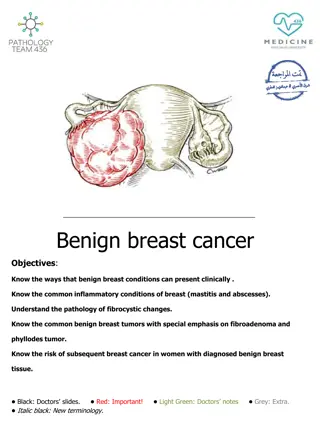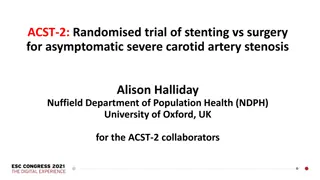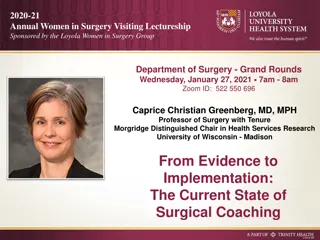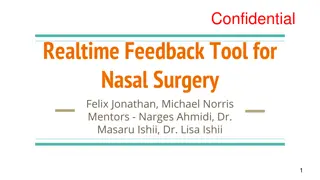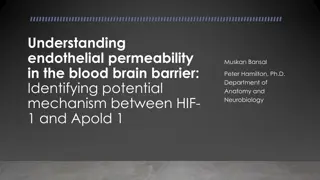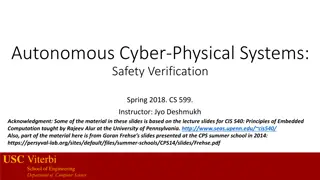Major Barrier to RCTs in Breast Surgery: Surgeons' Lack of Understanding
Surgeons' lack of understanding of levels of evidence and trial methodology poses a significant obstacle to conducting Randomized Controlled Trials (RCTs) in breast surgery. This hinders progress in implant-based breast reconstruction and exploring new treatments. The opposition to RCTs is influenced by limited appreciation, lack of equipoise, and inherent surgical culture, which impact the acceptance and conduct of RCTs in the field. Overcoming these barriers requires efforts to enhance knowledge, promote evidence-based practices, and foster a culture that values rigorous research methods.
Download Presentation

Please find below an Image/Link to download the presentation.
The content on the website is provided AS IS for your information and personal use only. It may not be sold, licensed, or shared on other websites without obtaining consent from the author.If you encounter any issues during the download, it is possible that the publisher has removed the file from their server.
You are allowed to download the files provided on this website for personal or commercial use, subject to the condition that they are used lawfully. All files are the property of their respective owners.
The content on the website is provided AS IS for your information and personal use only. It may not be sold, licensed, or shared on other websites without obtaining consent from the author.
E N D
Presentation Transcript
Surgeons lack of understanding of levels of evidence and trial methodology is a major barrier to RCTs in breast surgery. G. Davies, N. Mills, C. Holcombe, S. Potter Background
What is the problem? Implant-based Breast Reconstruction
Phases 1. National Practice Survey 2. Prospective Cohort Study 3. Mixed Methods Acceptability Study 4. Design of a Pragmatic RCT Evaluating outcomes of implant-based breast reconstruction
Aims Explore acceptability of proposed RCT designs Identify potential barriers to RCT conduct Inform design of a large-scale pragmatic RCT
Semi-structured qualitative interviews 31 Healthcare professionals Data analysed thematically Concurrent sampling, data collection, & analysis until data saturation achieved Methods
Limited evidence base Fundamentally, there is a question where we don t know which is better and which is worse. It would be great to know that. Results
Opposition to RCTs Results
Opposition to RCTs 1. Limited appreciation of the value of RCTs 2. Lack of equipoise 3. Inherent surgical culture Results
Systematic reviews & Meta-analyses Limited appreciation of the value of RCTs RCTs Cohort studies Case control studies Cross sectional surveys Case studies Ideas, expert opinions, editorials Anecdotal
Non-randomised studies sufficient Do we really, really need an RCT? I think we really, really need good data collection and to share our data none of us need to re-invent the wheel I think prospective audit is going to give you enough evidence, as long as it is properly audited Results -Limited appreciation of the value of RCTs
Surgery lots of variables I do understand the value of it and the order of the hierarchy of the evidence, but it s a handcraft discipline.It s not like radiotherapy or oncology where you re delivering a defined intervention. If, at the end of the day, the variables are so significant then any intelligent researcher would be asking the question, What is the value?What are we trying to achieve here? Results -Limited appreciation of the value of RCTs
Surgery lots of variables In terms of outcomes and things, to my knowledge there are no randomised controlled trials on outcomes, but part of me does think that a lot of this is an art as well as a science. So I think you can do trials. but I think also it's very much down to the individual patientsand their skin quality. Results -Limited appreciation of the value of RCTs
Randomisation process The ladies love the idea of the trial, but they don t want a computer to make that decision for them. Results -Limited appreciation of the value of RCTs
Lack of equipoise
Clinician equipoise I don t see a reason to go back and do a pre-pectoral on a randomised controlled study because I know that it s not equal. I know pre-pectoral is a lot better. Results Lack of equipoise
Patient choice There will be a group where you could do either, but you ve also then got to factor in the patient s preference. It s not just the surgeon who s got to have equipoise, it s the patient. Results Lack of equipoise
Based on what? Personally if you ask me, I d say I wouldn t randomise patients. Although I couldn t state that there is enough scientific evidence to prove it, in my limited experience which isn t published I still would say, I think it s not something I d want to do Results Lack of equipoise
Inherent surgical culture
Guided by personal experience I think the sort of surgical mind-set is that during your training you see other people doing different things and you work out what you think is the best thing for whatever reason, without it really being evidence based or tested or audited in a kind of multicentre way. What works in your hands, works in your hands. Results Inherent surgical culture
Guided by personal experience Yes, well that s the thing with surgeons isn t it? It s habit. If it s always worked for you, it s quite difficult not to do that. Results Inherent surgical culture
Limited appreciation of the value of RCTs RCT in breast surgery Lack of equipoise Inherent surgical culture Conclusion
Surgical Trials Centres Surgical Trainee Research Collaboratives Overcoming barriers
But we always need good quality evidence, and good quality evidence comes from randomised trials. I think in this day and age you need to be practicing evidence-based surgery. You can t just say, Oh, but it works nicely in my hands. That s not good enough. I think it's all about how you explain it to the patient, but it's absolutely achievable. If people say you can't do it, it's they can't do it. They're failing to do it. It's a communication skill that everyone should have and should learn. If you're not offering [trials], you are depriving patients' choice. It is achievable!
RCT in breast surgery RCT in breast surgery Presenter: Gareth.davies@doctors.org.uk Supervisor: Shelley.potter@bristol.ac.uk Any questions?
